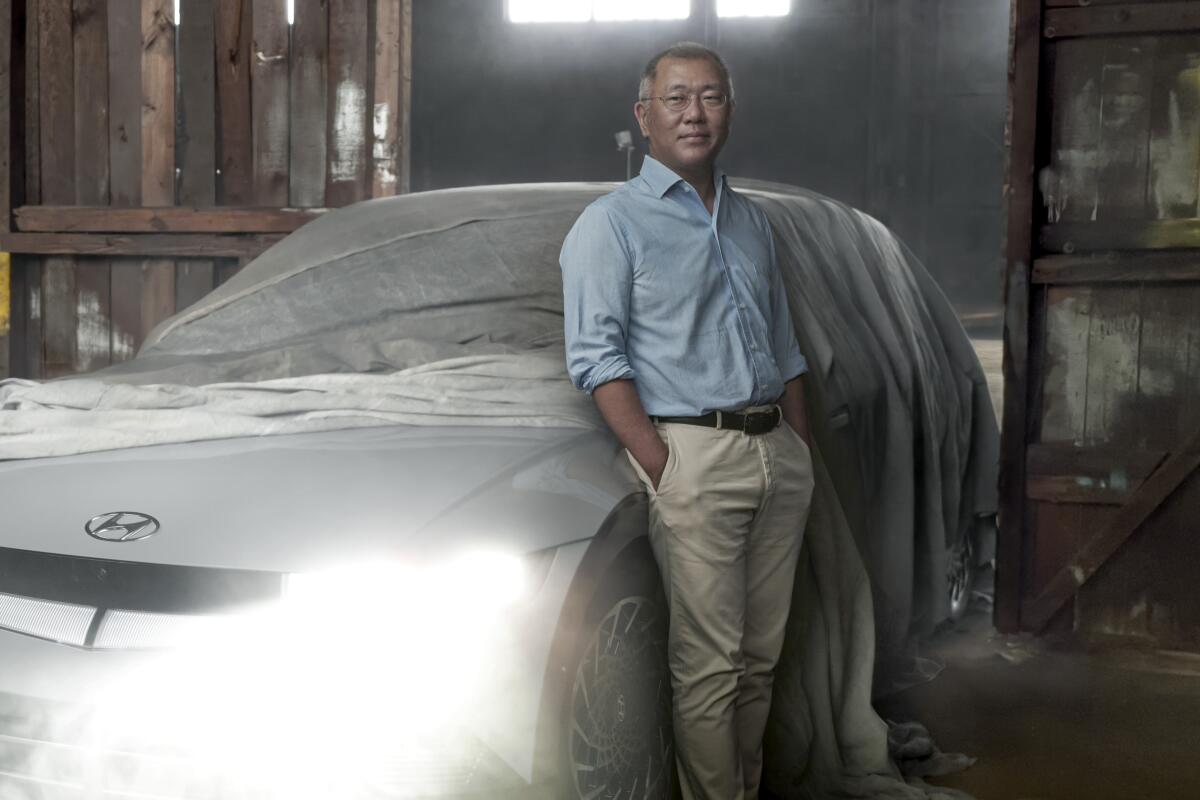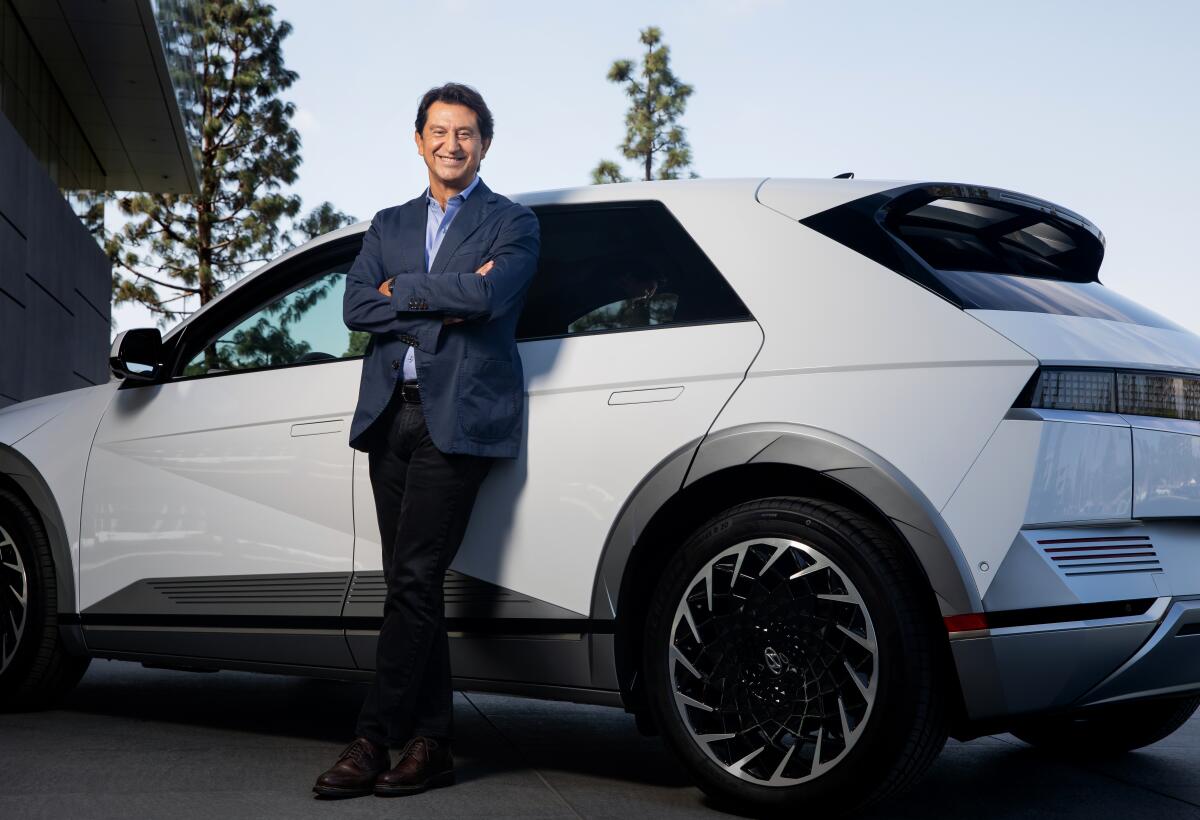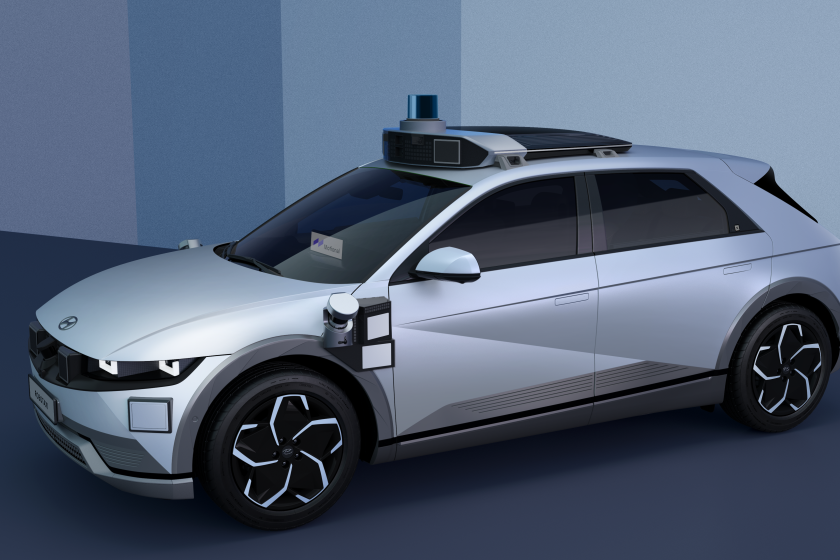Hyundai was poised to become Tesla’s top contender. Then the U.S. government blindsided it

K-drama, K-pop, kimchi, bibimbap: Korean culture, in the form of entertainment and food, has long taken hold in California and across the U.S.
It’s time to add Korean cars to the list.
Sure, Korean automakers have been selling cars in the U.S. for decades ‚ÄĒ and successfully, though trying to overcome a reputation for low-price, high-value alternatives to Japanese cars.
Now, Korean cars are turning cool. Hyundai, Genesis and Kia ‚ÄĒ all made by Hyundai Motor Group ‚ÄĒ have not only achieved parity with the world‚Äôs top automakers but also ‚Äúin some segments they‚Äôve passed the Japanese,‚ÄĚ said Jessica Caldwell, auto analyst at Edmunds.
Especially notable is the high style and early success of the group‚Äôs new electric cars. ‚ÄúThe Ioniq 5 and Ioniq 6 are standouts,‚ÄĚ Caldwell said. ‚ÄúThey‚Äôre doing what Tesla did years ago ‚ÄĒ turning heads.‚ÄĚ
Driverless car technology company Motional will be putting autonomous Hyundai Ioniq 5 EVs on the road around L.A. as it looks to the city for engineering talent.
Japanese automakers, meanwhile, lag so far in EVs that it’s causing agita and turnover in their top executive ranks, especially at hybrid-centric Toyota, which recently replaced its chief executive.
Tesla remains far out front in electric car sales, with 59% market share in the U.S., according to Edmunds. But companies such as Hyundai, with fresher models and new body designs, have Elon Musk looking over his shoulder.
When the Hyundai Ioniq 5 and the Kia EV6, compact electric SUVs with base prices around $48,000, debuted a year ago, U.S. sales totaled 37,000 vehicles in the first three quarters of 2022. The Ioniq 5 and the EV6, built on the same basic platform, together overtook the Ford Mustang Mach-E as second-place contender, according to Edmunds. The Korean brands were poised to take the mantle as Tesla’s top challenger, and because of their lower price, perhaps move the needle forward on mass adoption of EVs.
Then the Inflation Reduction Act, the Biden administration’s $369-billion climate bill, put on the brakes. Under the act, only electric vehicles assembled in the U.S. would qualify for a $7,500 customer tax rebate, bad news not just for Hyundai and Kia but also for all electric car makers in Japan and Europe. That part of the IRA kicked in immediately when President Biden signed the bill in August.
Nearly 1 in 5 new car sales in California were zero-emission in 2022, but most of them are Teslas and other high-end models. That shows how far the state has to go in making the shift to electric vehicles equitable.
The result: Hyundai/Kia EV sales slowed dramatically and the Ford Mustang Mach-E retook second place.
Hyundai execs said they felt blindsided, especially after President Biden told a Korean delegation at the White House weeks before the Inflation Reduction Act was passed, ‚ÄúWe‚Äôve got your back,‚ÄĚ according to Hyundai North America head Jose Munoz.
‚ÄúWe‚Äôre not happy about it,‚ÄĚ he said in a recent interview at the Hyundai Motor America offices in Fountain Valley. Especially after years spent trying to meet regulatory demands while also trying to design cars that American consumers want to buy.
Seoul change
At Hyundai Motor Group headquarters in Seoul six years ago, the vast tile-floored lobby beneath twin office towers (one for Kia, one for Hyundai) was spare, sterile and hushed. Older men in dark suits and neckties quietly went about their business.
Today the same lobby is hard to recognize, with a vibe more like a big coffee bar in a hip district of Seoul. Young men ‚ÄĒ and women ‚ÄĒ hang out together at cafe tables, pop music streaming. Gray-haired guys, some still in sport coats ‚ÄĒ but no ties ‚ÄĒ are scattered about, fitting in as best they can.
The company‚Äės culture took a remarkable turn in 2020 on the ascendence of Euisun Chung to Hyundai Motor Group executive chairman. He‚Äôs the 52-year-old grandson of Hyundai founder Juyung Chung, who turned a single automobile repair garage in 1940s Seoul into a global industrial powerhouse.
In his latest management shake-up, grandson Chung promoted 224 employees, with a focus on research and development, and put more emphasis on promoting people under 50 to high positions, which is considered a bold move in South Korea.
In 2020, he began laying what Hyundai executive John Suh calls ‚Äúfoundational technologies.‚ÄĚ That year, he sealed a joint venture called Motional (which is planning to offer robotaxi service in Los Angeles), bought humanoid robot-maker Boston Dynamics, and formed an electric air taxi company, Supernal.
Suh, who joined Hyundai in 2011, runs Hyundai‚Äôs New Horizons Design Studio in Fremont, Calif., where a team is trying to add legs to off-road vehicles for easier climbs out of tough spots. Although Hyundai has long had a reputation for innovation, Suh said, under the new chairman, ‚ÄúThings really went to a different level. It‚Äôs amazing to see.‚ÄĚ
Before Euisun Chung took control, the company faced hard decisions on how aggressively to pursue the pure-EV market. The Japanese companies were playing it safe, especially Toyota, assuming that its expertise in hybrids would carry it forward, and that range anxiety would cause consumers to prefer a car with a battery for shorter trips and gasoline engine for long ones.
At Hyundai, Chung heard out different opinions among his top executives. ‚ÄúThere were a lot of perspectives,‚ÄĚ Heung Soo Kim told The Times at his office in Seoul. ‚ÄúSome people at the time believed in EVs and some didn‚Äôt.‚ÄĚ Kim was a believer. After all, he‚Äôs head of EVs for Hyundai Motor Group. Chung ultimately decided to go all-in on EVs.
The key decision was to build an EV-only platform on which to build the cars. Previously, on cars such as the Hyundai Kona and Kia Niro, the company swapped electric drives into cars that were developed for gasoline engines. The platform is called E-GMP, an ungainly name but a technology with a rich commitment: $16.5 billion on EV development through 2030.
‚ÄúOur vision is to have an entire portfolio ‚ÄĒ hybrid, plug-in hybrid, fuel cell, battery,‚ÄĚ Kim said.
Plenty of other automakers are developing their own EVs, and Tesla has proved that customers want cars that are exciting. Bland wouldn’t cut it.
The dedicated EV platform allows designers a lot more flexibility than gasoline cars, which have large and complicated engine assemblies taking up all the space under the hood, real estate that could otherwise be granted to drivers and passengers.

When the Ioniq 5 hit the market in December 2021, it was an instant hit. Its design stands out from the pack but isn‚Äôt weird. ‚ÄúThe big challenge is to go further in design without scaring our existing customers too much,‚ÄĚ said Simon Loasby, head of the Hyundai Styling Group in Seoul. The Ioniq 5‚Äôs lines remind older customers of the company‚Äôs original export, the Pony, but with a modern stamp inspired, Loasby said, by the pixel. ‚ÄúThe pixel is the building block,‚ÄĚ he said. ‚ÄúIt‚Äôs recognized from Pong to Minecraft.‚ÄĚ
The company will release the Ioniq 6 in the U.S. this year. Football fans may have seen it in commercials aired during the playoffs. It‚Äôs a smooth, aerodynamic sedan that Car & Driver magazine called ‚Äúsmooth as a river rock.‚ÄĚ It looks nothing like the Ioniq 5. And the upcoming Ioniq 7 large SUV will resemble neither of its predecessors. That contrasts with Tesla cars, which, with the obvious exception of the storied Cybertruck, seem to come from the same mold.
The company has not completely avoided bumps in the road. Hyundai and Kia have had their share of recalls, including a massive recall for engine fire risk in 2022. Recently, the companies faced a ‚Äúsocial media challenge‚ÄĚ from thief-gamers using software flaws to steal Hyundai and Kia vehicles. A software fix was recently issued.
And the company is reportedly in talks with the U.S. Department of Labor on ways to make sure no children are hired to work in its U.S. plants or those of its suppliers. Third-party staffing agencies were found last year to be hiring underage Central American workers for factories owned or connected to Hyundai.
‚ÄúHyundai does not condone or tolerate violations of child labor law,‚ÄĚ Hyundai spokesman Michael Stewart said. ‚ÄúAfter we learned of alleged violations at several suppliers, we took immediate actions, including launching an investigation and a broader review of our U.S. supplier network. At our request, one supplier‚Äôs upper-management team has been replaced, and two suppliers have terminated their relationships with the third-party staffing agencies who falsely certified that they had screened and cleared underage individuals as being of legal age.‚ÄĚ
Still, the list of accolades directed at the electric offerings from Hyundai, Genesis and Kia is lengthy. Motor Trend named the Ioniq 5 its 2023 Car of the Year. The praise went beyond the cars themselves. The magazine also crowned Chung as No. 1 on its Power List of auto industry executives. (Elon Musk came in at No. 42.
‚ÄúTesla may have popularized electric cars, but Hyundai Motor Group is democratizing them, flooding the market with a wide variety of models, both styles and price points, and making them super cool or drop-dead gorgeous. Or both,‚ÄĚ Motor Trend said.
Bearing with Biden
Not so pretty: The prices. The Inflation Reduction Act in effect nicked Hyundai’s good-value reputation, as the climate bill gives competitors such as Ford, GM and Tesla, which currently build and sell EVs in the U.S., a $7,500 tax-rebate advantage per car.
The Treasury Department is working out ways to ease the pain and recently agreed to give EV imports a $7,500 tax credit ‚ÄĒ but just on leases. Hyundai and Kia plan to increase leases from 5% of sales to 30% as a result. There are more Treasury clarifications and rulings on the act‚Äôs byzantine requirements yet to come. And the Biden administration is considering ‚Äúlimited‚ÄĚ free-trade agreements to address the issue, Treasury Secretary Janet L. Yellen said last week.
‚ÄúThe Inflation Reduction Act represents a historic investment in combating the climate crisis and a green energy transition ‚ÄĒ which benefits not just the United States, but our partners around the world,‚ÄĚ Sam Michel, spokesperson for the U.S. trade representative, said in a statement to The Times. ‚ÄúSince the legislation was signed into law, we have engaged extensively with our South Korean counterparts to hear their concerns and discuss the implementation and impacts of this once-in-a-generation investment.‚ÄĚ
Mike DaSilva, a Hyundai-Genesis-Kia car dealer in New Jersey, hopes officials hurry up. ‚ÄúIf the goal was to incentivize consumers to speed up the adoption of EVs, then do it,‚ÄĚ he said. ‚ÄúIt‚Äôs complicated and confusing, with way too many flaming hoops to jump through.‚ÄĚ
Georgia‚Äôs head of economic development, Pat Wilson, told The Times that the legislation may have been well intended, ‚Äúbut it really penalizes companies that are investing in the U.S. That‚Äôs a slap in the face of those companies that give back to the communities and that hire U.S. citizens.‚ÄĚ
Hyundai is constructing a new EV plant in Georgia, set to open in 2025, in addition to the two Kia and Hyundai assembly plants that have been operating for years in Georgia and Alabama. The company also operates design studios, parts plants, engineering centers and new-mobility projects coast to coast.
Today, Hyundai Motor Group said it employs 21,700 U.S. workers. The Georgia electric vehicle plant, planned long before the Inflation Reduction Act was ever thought of, will add 8,100 jobs once it opens in 2025.
Hyundai and Kia aren’t the only automakers that believe the U.S. government is turning its back on EV makers that already invest big in America. European and Japanese car companies are lodging protests, as well as officials from their home governments.
The Treasury Department, well aware of the controversy, is expected to issue new tax rulings in March that could ease the pain. The decision could mark a new chapter in U.S.-South Korea relations.
More to Read
Inside the business of entertainment
The Wide Shot brings you news, analysis and insights on everything from streaming wars to production ‚ÄĒ and what it all means for the future.
You may occasionally receive promotional content from the Los Angeles Times.













